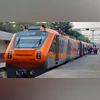Semi-high speed Vande Bharat train will soon link Jammu with Srinagar, becoming the first train to connect the two capitals of the Union Territory through Udhampur-Srinagar-Baramulla (USBRL) rail link -- which in turn will link the UT with national capital Delhi.
The train will cover the stretch between Jammu and Srinagar in three hours and 10 minutes.
“The Commissioner of Railway Safety (CRS) will complete their inspection of the Katra-Banihal section of the Udhampur-Srinagar-Baramulla Rail Link (USBRL) today. Once that is in place, we will be able to commission the line any time,” a top government official said on Wednesday.
Once inaugurated, the train from Katra will leave at 8:10 in the morning and reach Srinagar at 11:20 a.m.
Most of the Katra-Banihal section is tunnels which have been constructed using the Himalayan tunneling method.
The Vande Bharat Express for this route has been customised to handle the freezing temperatures in the Valley, with silicone heating pads for water pipes and heating elements in windshield to ensure loco pilot visibility and safety of the train.
Also Read
With the Chenab bridge and several other infrastructure links falling in Zone-5 with a high vulnerability to earthquakes, the construction of the bridges has been done using pre-loaded spring dampers, which absorb the impact of seismic activity on the bridge.
Similarly, a centralised tunnel control centre will monitor the 97 kilometres (km) of tunnels in real-time, with monitors for tunnel health and seismic activity in place.
The government will also start work on developing Gati-Shakti Cargo Terminals across the rail line to boost economic activity in the Valley, the official said.
He also said that key issues between the ministry of railways and Russian rail manufacturer Transmashholding (TMH) -- operating in a joint venture with Indian PSU Rail Vikas Nigam (RVNL) called Kinet Railways -- over the contract for the manufacturing of 120 Vande Bharat trains have been resolved.
Late last year, the ministry had changed design specifications for its order of Vande Bharat trains, seeking to enlarge the size of the train from 16 to 24 coaches, with requirements of an additional toilet per coach, a pantry car, and other specifications.
These would have led to cost escalations, according to the Russian manufacturer leading the venture.
“The ministry has decided not to go forward with the requirement of a pantry car and the fourth toilet, which had been the major points of contention. Other issues will be resolved soon,” the official said.
The JV will develop 120 Vande Bharat trains in Latur in Maharashtra at a cost of Rs 58000 crore, or Rs 120 crore per train.
)